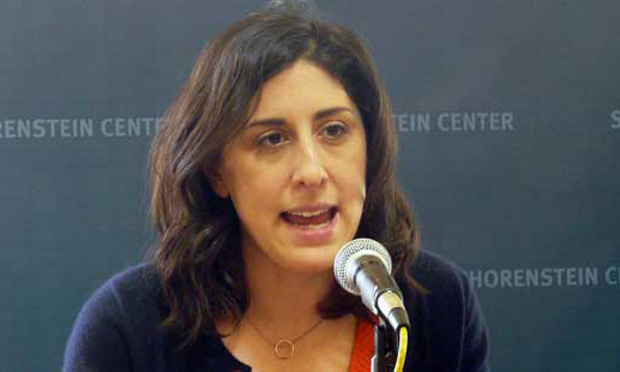Sarah Kliff, deputy managing editor for visuals at Vox, discussed media coverage of the Affordable Care Act and what’s next for health care policy in a March 29 talk at the Shorenstein Center.
Kliff has been a reporter at Vox, The Washington Post, Politico and Newsweek and began covering health care policy in April 2010, the month after the Affordable Care Act passed. Her friends were baffled at the time, she said, wondering what she would write about with the large legislative battle seemingly over. Yet the past six years proved to be anything but boring, with multiple Supreme Court cases and a government shutdown challenging the law, as well as differences in implementation at the state level.
“Implementation and regulation are not usually the most exciting beats to have, but with health care they really were,” said Kliff. The Affordable Care Act is also a “big sprawling law” and encompasses more than health insurance and Medicaid expansion. For example, the law also includes a tax on tanning salons and requirements for fast food restaurants to include calorie labels, Kliff explained.
Media coverage of the Affordable Care Act has been important in shaping how people view the impact of the legislation, said Kliff. She noted that 6 percent of the U.S. population gained coverage after its passage while 80 million Americans already had health insurance through their employers. “Most of us aren’t experiencing Obamacare directly, we’re learning about it secondhand from news sources and the people that we talk to,” she said.
Regarding Obamacare, she said, “the set of stories becomes very polarized, very separate. It’s very easy to live in two different worlds where Obamacare is a completely different law.”
“If you’re someone who’s in favor of Obamacare…you’re hearing this reinforced story about the good things that Obamacare is doing like expanding insurance, or that health care costs are growing at slower rates,” Kliff continued. If you oppose Obamacare, you’re “hearing stories about the people who lost insurance and the people who have had their premiums go up.”
As a result of these two different, entrenched narratives, public opinion has changed little since the passage of the law, she said.
“In April 2010, 46 percent approved and 40 percent disapproved. This year, 41 percent approved, 46 percent disapproved,” said Kliff. When asked about whether the Obama administration could have done more to influence public opinion, she said it was unlikely, because opinions about the healthcare law and the president are closely correlated. “Obamacare is a proxy for Obama,” she said.
In terms of the 2016 presidential election, Kliff noted that Republicans in 2012 pushed to stop the implementation of the Affordable Care Act. “In this election cycle, there’s definitely a lot less Obamacare repeal talk,” she said. During the previous election, in 2012,“the gains of Obamacare were mostly theoretical…now those people have insurance, and now when you talk about repealing Obamacare, you’re talking about taking away their insurance, and that really changes the debate.”
Kliff said that, in her opinion, presidential candidates have proposed “grandiose” plans that “fall a bit short of their promises.” She discussed Bernie Sanders’ single-payer plan and said that, as it stands, it “likely falls short of paying for all of the health care that it offers,” as it makes assumptions about prescription drugs savings that Kliff contended “weren’t quite right.” Donald Trump set himself apart from other Republicans by saying that everyone would have access to better options than those provided by the Affordable Care Act, but the details of his plan don’t deliver on that promise, said Kliff. “It looks very similar to a typical Republican repeal plan. The [Committee] for a Responsible [Federal] Budget in Washington estimated that 21 million people would lose insurance.”
With 27 million people still uninsured and “incredibly high” health care prices, “there’s a lot of work left to do, and 2016 seems to be the election where the conversation is just starting about that next level of work,” said Kliff.
Kliff also discussed Vox’s approach to covering policy. “Vox is an argument about what was missing in journalism,” she said. She said that she and her Vox colleague Ezra Klein learned at Wonkblog that there was “a real appetite for policy news,” but that readers didn’t have a “great resource” for learning about policy. “We took the questions that people had and we tried to answer them to the best of our ability, and I think that’s what Vox grew out of,” she said.
“One of the founding ideas of Vox is, We can’t just say ‘that’s a boring issue, that’s not going to get attention.’ We have to work harder to make our stories more accessible and more interesting,” Kliff said. At Vox, this has meant introducing interactive multimedia features like their explainers and a tax calculator that shows the reader’s tax rate under each presidential candidate’s tax plan.
During the question and answer session, Kliff also discussed access to women’s health care and contraception at the state level, the challenges of implementing a single-payer system in Vermont, improving the efficiency and outcomes of health care spending, and her tips for aspiring policy reporters, among other topics. Listen to the full audio recording above.


Expert Commentary